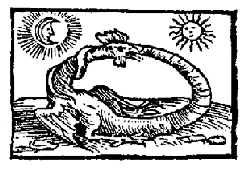The Beginning of Musical Idolatry
7.22.14 Part
Two Lynn Anderson Psallo
- If you say that God commanded or even permitted the use of
musical instruments in the Ekklesia-Synagogue or Church of
Christ (the Rock) in the wilderness.
- And God did NOT command but repudiated any of the
hypocritic arts and crafts.
- Then the Spirit OF Christ in Jeremiah
23 says that you BLASPHEME the Holy Spirit OF Christ.
- If you say that PSALLO in the HEART means Playing any kind
of musical instrument.
- When Psallo never means more than pluck a string with your
finers but never with a plectrum or guitar pick.
- Then reading 101a says that you lie to God and about God.
- If you say that psallein means Play a Harp
- And you say that A spirit commanded you to impose playing
all kinds of instruments.
- Then recording history including the Jacob-cursed and
God-abandoned Levites you have outed a feminine or
effeminate leadership just as Christ prophesied in Isaiah 3.
Cyrus was told how to "make the captive men helpless" rather
than kill them. Heredotus
records history:
Grant, then, forgiveness to the Lydians,
and to make sure of their never
rebelling against thee, or
alarming thee more,
send and forbid
them to keep any weapons of war,
command them to wear tunics
under their cloaks,
and to put buskins
upon their legs,
and make
them bring up their sons to cithern-playing (Kitharizein),
and singing (psallein),
and shop-keeping (Hucksterism).
[Corrupting the Word]
So wilt
thou soon see them become WOMEN instead of men,
and there will be no more fear of their revolting from
thee."
Any
kind of performing music when Jesus told us to SPEAK
that which is written INTENDS to bring glory and more
"Authority" to King set over us:
-[4]
Ludoisi de sungnômên
echôn tade autoisi epitaxon, hôs mête aposteôsi mête
deinoi toi eôsi: apeipe men sphi pempsas hopla arêia mê
ektêsthai, keleue de spheas kithônas -[khiton
David's garment] te
hupodunein toisi heimasi kai kothornous hupodeesthai,
proeipe d' autoisi -kitharizein te kai psallein kai kapêleuein [prostitutes, petty trade, playing tricks,
corrupting] paideuein tous paidas. kai tacheôs spheas ô
basileu gunaikas ant' andrôn opseai gegonotas, hôste
ouden deinoi toi esontai mê aposteôsi."
The word kitharizo
means to PLAY THE CITHARA and does not include singing.
-Kitharizô 1
[kitharis] to play the cithara, phormingi
[Apollo, Abaddon, Apollyon] kitharize Il., Hes.; lurêi
eraton kitharizôn Hhymn. (so that there can have been no
great difference between the kithara, lura, and phorminx
); kitharizein ouk epistatai, of an uneducated person,
-
-Kithar-isis , eôs,
hê, playing on the cithara, Pl.Prt.325e; k.
psilê, i.e. without the voice,
Id.Lg.669e, cf. Pae.Delph.15; aulêsis kai k.
Phld.Mus.p.23 K.
- Isn't it an insult to the Spirit of Christ
and Paul to say that they were not smart enough to use one
of the single words or compound word even simple would
understand?
The PSALLO word used to GRASP POWER is an Abaddon word from plucking the Bow String to kill you or plucking the Lyre to
mollest you.
-Arassô ,of any violent impact, with collat. notion of rattling, clanging,
as of horses, hoplais, pound in a
mortar, strike with
a shower of stones.
a). kitharēn strike
the lyre, humnon, melos, etc., Nonn.D.1.15,440,
etc.
2. c. dat. modi, arassein tina
oneidesi, kakois, assail
with reproaches
or threats,
II. Pass., to be dashed against, dash one against the
other
Pound in a mortar, “holmō a.” Nic. Th.508
Nonn.D.1.15
[11] Bring me the fennel, rattle the cymbals,
ye Muses! [Mousai] put in my hand
the wand of Dionysos whom I sing:
but bring me a partner for your dance in the
neighbouring island of Paros, Proteus of many turns, that
he may appear in all his diversity of shapes, since I twang [psauō
touch] my harp
to a diversity of songs.
[poikilon]
For if, as a
serpent, he should glide along his winding
trail,
I will sing
my god’s achievement, how with
ivy-wreathed wand
he destroyed the
horrid hosts of Giants serpent-haired.
aeidō
Opposite logos
kalōs
rhētheis,
Lexis is opposite to Ode
Was the Spirit of Christ too stupid to command that we Twang
(psallo) a Harp and Sing "that which is written
for our learning?"
Nonn
1.[439] “Let’s have a
friendly match, if you like. Come on, you make
music and sound your reedy tune, I
will crash my thundery tune. You puff our
your cheek all swollen with wind, and blow with
your lips, but Boreas is my blower, and my thunderbolts
boom when his breath flogs them. Drover, I will pay you
for your pipes: for when I shall hold the sceptre
instead of Zeus, and drive the heavenly throne, you
shall come with me; leave the earth and I will bring
you to heaven pipes and all, with your flock too if you
like, you shall not be parted from your herd.
Nonn
1.[326f] The professional cattle-lifter
[Hermes] may think he is catching a bull and steal his own
father! He may give his harp once again to
your son Phoibos, [Apollo,
Abaddon, Apollyon] as price for the ravisher
ravished. But what can I do? If only Argos were
still alive, shining all over with sleepless eyes, that he
might be Hera’s drover, and drag Zeus to some
inaccessible pasture, and prod his flanks with a crook!’”
[486] “You liked the little tune of my
pipes, when you heard it; tell me, what would you do when
I [1] strike [arassō]
out a [2] hymn of victory on the 31] harp [kitharēn] of seven
strings, to honour your throne? Indeed, I matched myself
against Phoibos with his heavenly quill [plektron-pick], and beat
him with my own harp
Croesus thought the
Lydians would even so be better off than if
they were sold
for slaves,
and therefore gave the above advice to Cyrus, knowing that,
unless he brought forward some notable suggestion, he would not be able to
persuade him to alter his mind. He was likewise afraid lest,after escaping the danger which
now pressed, the
Lydians at some future time might revolt from the Persians and
so bring themselves
to ruin.
Greek
and Latin total evidence on the word PSALLO which
is a pretty ugly word explaining why any making melody or
meditating should be IN the heart or spirit which is a
PLACE. People are quite happy to deliberately sow
discord based on a very simple lexicon. This paper separates
all WAYS IN WHICH THE WORD IS USED together with Greek and
Latin literature. There is no translation of Psallo other than
to SING which does not point to making war or used by male and
female prostitutes to seduce a young person.
Danny
Corbitt Psallo and Missing More than Music
Danny
Corbitt and Matt Dabbs Psallo
Danny Corbitt Refuting Everett Ferguson Psallo,
Psalmos, Psalmus, Psalma
John
T. Willis 2. "Sing" is vocal; "make
melody" is instrumental. Psalms 33:2-3; 144:9;
149:1, 3 make this crystal clear. Amos 5:23 further
verifies this reality. People forget that
God turned Israel over to worship the starry host
because of musical idolatry at Mount Sinai. The Levites
were under the KING and the COMMANDERS of the army: they
made war and not worship. We will examine these passages
in context.
The BEAST defined by the Spirit OF Christ in Jeremiah and in
the book of Revelation are gender-compromised self-speakers,
singers, instrument players and actors. Jesus
called the Scribes and Pharisees, hypocrites: in the Ezekiel
33 version Christ names mercinary preachers, singers,
instrument players and the audience. The musical performances
or in Revelation "A New Style of Singing or Drama" are defined
by Christ:
Christ's ROPHECY OF THE BEAST
Jeremiah 15:2 And it
shall come to pass,
if they say
unto thee, Whither shall we go forth?
then thou
shalt tell them, Thus saith the LORD;
Such as are
for death, to death;
and such as
are for the sword, to the sword;
and such as
are for the famine, to the famine;
and such as
are for the captivity, to the captivity.
Jeremiah 15:3 And I will appoint
over them four kinds, saith the
LORD:
the sword to
slay,
and the dogs
to tear,
and the fowls
of the heaven,
and the beasts
of the earth,
to devour
and destroy.
Greek
and Latin total evidence on the word PSALLO which
is a pretty ugly word explaining why any making melody or
meditating should be IN the heart or spirit which is a
PLACE. People are quite happy to deliberately sow
discord based on a very simple lexicon. This paper separates
all WAYS IN WHICH THE WORD IS USED together with Greek and
Latin literature. There is no translation of Psallo other than
to SING which does not point to making war or used by male and
female prostitutes to seduce a young person.
Quick Added Notes 4.06.13
These represented all of the pagan
sects in Rome such as those of Dionysus and
Orpheus. Both could be pointed out on
the days when types of foods were available or
prepared in the marketplace or the pagan temples in
the Agora: in Athens it was quite separated from the
Ekklesia for word-only discussions. The men
who translated the Septuagint or LXX were aware that
the PSALLO-based words pointed to making war or
making strang love in the marketplace. Any lawful
citizen able to attend the assembly was swept up by
slaves using a red, polluted rope and driven to the
ekklesia for instruction only.
A gang of slaves,
called Scythians, carrying ropes dipped in red
ochre (miltos, hence Miltiades, i.e. the Red-Haired)
would travel through the city on the days the Ecclesia
was to meet, and would lash those citizens
not in attendance with their ropes. With garments
thus stained, shamed citizens could legally
carry out no business until they visited the
meeting grounds of the Ecclesia on the hill called
the Pnyx.
 -psallō , fut. so
miltokharēs
skhoinos
psallomenē
a carpenter's red line, which is twitched
and then suddenly let go, so as to leave a
mark, AP6.103
(Phil.): -psallō , fut. so
miltokharēs
skhoinos
psallomenē
a carpenter's red line, which is twitched
and then suddenly let go, so as to leave a
mark, AP6.103
(Phil.):
-Phurô I. to mix something dry with
something wet, mostly with a sense of mixing so as to soil or
defile, to be doomed to have one's hair
defiled with earth, II. metaph. to mingle together,
confuse, bioton
ek
pephurmenou
kai
thēriōdous
diestathmēsato
from a confused and savage state, E.Supp. 201.
Agora a^g, as, Ion. agorē , ēs, hē, (ageirō):— 2. market-place,
III. business
of the agora:
1. public speaking, gift
of speaking, mostly in pl., eskh' agoraōn withheld him from
speaking, generally, provisions, supplies,
Agoraios b. agoraios, hē, market-day,
IGRom.4.1381 (Lydia).
(The distn. agoraios vulgar,
agoraios public
speaker, drawn by Ammon.,
etc., is prob. fictitious.)
Agorazō a^g, fut. asō Ar.Lys.633,
Men. 828:—frequent
the “agora, hai gunaikes a. kai kapēleuousi” Hdt.2.35,
4.164,
cf. Arist.Ph.196a5,
Com.Adesp.710; occupy
the market-place, Th.6.51.
2Corinthians 2:14 Now thanks be unto God, which always
causeth us to triumph in Christ,
and maketh manifest
the savour of HIS knowledge by us in
every place.
2Corinthians 2:15 For we are unto God a sweet savour of
Christ, in them that are saved, and in them that perish:
2Corinthians 2:16 To the one we are the savour of
death unto death;
and to the other
the savour of life unto life. And who is sufficient for
these things?
2Corinthians 2:17 For we are not as many,
polus great,
mighty, “megas
kai
pollos
egeneo”
Hdt.7.14,
cf. E.Hipp.1;
ho
p.
sophistēs,
stratēgos
stra^tēg-os 5.
an officer who had the custody of the
Temple at Jerusalem, “ho
s. tou
hierou”
Ev.Luc.
22.52, Act.Ap.4.1,
J.BJ6.5.3.
which corrupt the word of God:
but as of sincerity, but as of God,
in the sight
of God
speak
we in Christ.
ka^pēl-euō , A.
to be a retail-dealer, drive a petty trade,
Hdt.1.155,
2.35,
Isoc.2.1
2. metaph., k. ta prēgmata, of Darius, Hdt.3.89;
k. ta mathēmata sell
learning by retail, hawk it about,
Pl. Prt.313d;
“k. ton logon tou theou” 2 Ep.Cor.2.17;
adultery
The Psallo based words MARK a church, Kirke, or
Circe: it is the mark of marketimereligion.
You remember that Jesus cast the pipers inducing singing
or lamenting or dancing into the MARKETPLACE along with
all of the other merchandisers: there SHALL NOT--CANNOT
be a Canaanite or Trader in the House of God
Zech
14:21 Yea, every pot in Jerusalem and in Judah shall
be holiness unto the Lord of hosts: and all they
that sacrifice shall come and take of them, and
seethe therein:
and in that
day there shall be no more the Canaanite in
the house of the Lord of hosts.
Kennaniy
(h3669) ken-ah-an-ee'; patrial from 3667; a Kenaanite
or inhabitant of Kenaan; by impl. a pedlar
(the Canaanites standing for their neighbors
the Ishmaelites, who conducted mercantile
caravans): - Canaanite, merchant,
trafficker.
H3667 kena‛an ken-ah'-an From H3665
; humiliated; Kenaan, a son of Ham; also the
country inhabited by him:—Canaan, merchant,
traffick.
Mercātor ,
ōris, m. id.,
I.
a trader, merchant,
esp. a wholesale dealer (opp. to caupo, a
retailer; class.).
B.A buyer,
purchaser: “signorum,” Cic. Verr. 1, 20,
60: “veneni,” Juv. 13, 154.
The word CHURCH does not define the Ekklesia:
kuklos of the circle
which hunters draw round their game,
3 place
of assembly, of the “agora, hieros k.” Il.18.504;
“ho k. tou Zēnos tōgoraiou”
b. crowd of people
standing round, ring or circle of people,
Eur.
Hipp. 953 Continue then your
confident boasting, take up a diet of greens
and play the showman with your food, make Orpheus
your lord and engage in mystic rites, holding
the vaporings of many books in honor.2 [955] For
you have been found out. To all I give the warning:
avoid men like this. For they make you their prey with
their high-holy-sounding
words
while they contrive deeds of shame.
2 Theseus compares
Hippolytus to the Orphics, an ascetic
religious sect that ate a vegetarian diet
and had a reputation for hypocrisy.
Bakkh-euō ,
A. celebrate the mysteries
of Bacchus, Hdt.4.79.
Eur.
IT 1243 Lovely is the son of Leto,
[1235] whom she, the Delian, once bore in the
fruitful valleys, golden-haired, skilled at the
lyre; and also the one who glories in her
well-aimed arrows. [1240] For the mother, leaving
the famous birth-place, brought him from the
ridges of the sea to the heights of Parnassus,
with its gushing waters, which celebrate the
revels for Dionysus.
The Dionysus
worshipers are those who do "evil things in the
dark." Paul silenced them and everything which did
not contribute to PEACE AND EDIFICATION which in
this case is ONLY Education by "using one mind and
one mouth to speak that which is written for our
learning" (Romans 15). Disciples are students or
learners and musical performances and speaking in
tongues are identified by the same word for SPEAK. |
That
doesn't stop the NACC 2013 Victorious to
continue their 100 year plan to promote 'unity' by using a
few subverted preachers to pretend that the the ANTI-instrumental people
will ever be invited.
Dr. A. T.
Robertson: "The word (psalleto)
originally meant to play on a stringed instrument (Sir.
9:4), but it comes to be used also for singing with the
voice and heart (Eph. 5:19; 1 Cor. 14:15), making melody
with the heart also to the Lord." (Comment on James 5:13,
Studies In The Epistle James, via Earl Robertson,
"Instrumental Music In Worship," p. 25)
However, Sirach or Ecclesiasticus (1611
KJV) translates the verse as SINGERS just like James.
Sirach 9:4. Do not associate with a woman singer,
lest you be caught in her intrigues.
Sirach 9:20.
Wine
and music gladden the heart,
but the love of wisdom
is better than both.
Sirach 9: 21. The flute and the harp make pleasant melody,
but a pleasant voice
is better than both.
Take thou away
from me the noise
of thy songs;
for I will not hear the melody of thy
viols. Am. 5:23
That chant to the sound
of the viol,
and invent to themselves instruments of
musick, like David; Am. 6:5
And the harp, and the
viol, the tabret, and pipe, and wine, are in their feasts:
but they regard not the work of the
Lord,
neither consider the
operation of his hands. Is. 5:12
That may be why Jesus cast out the women menstrials using a
word meaning "like dung." Of David:
Sirach 47:7. For he wiped
out his enemies on every
side,
and annihilated his adversaries the Philistines;
he crushed their power even to this day.
Sirach 47:8. In all
that he did he gave
thanks to the Holy One,
the Most High, with ascriptions of glory;
he sang praise with all his heart, and he loved his Maker.
Sirach 47:9. He placed
singers before the altar,
to make
sweet melody with their voices.
Sirach 47:10. He
gave beauty to the feasts,
and arranged their times throughout the year, while they
praised God's holy name, and the sanctuary resounded from early morning.
Instrumental noise
was to signal those present worship which means
to fall on their face
Sirach 50:16. Then the sons of Aaron shouted,
they sounded the trumpets of hammered work,
they
made a great noise to be heard
for remembrance before the Most High.
The people did not sing, clap and play
instruments as worship which would have gotten them
executed.
Sirach 50:17. Then all the
people together made haste and
fell to the ground upon their faces to
worship their Lord, the
Almighty, God Most High.
Now that they have worshipped.
Sirach 50:18. And the singers
praised him
with
their voices in sweet and full-toned melody.
This was the direct command by Christ for the Church in the
wilderness: they could BLOW silver trumpet to call the
assembly like a church bell. But they could not engage
in "vocal or instrumental rejoicing" because you don't DO
that in Bible class.
Psallo by itself just meant to pluck
something: you must define what is to be plucked. If
James wanted people to sing and play the harp he would have
used the dedicated word PsalmOdia.
Here is an example of its use in the
Bible
James 5:[12]
But above all things, my brothers, don't swear, neither by
heaven, nor by the earth, nor by any other oath; but let
your "yes" be "yes," and your "no," "no;" so that you
don't fall into hypocrisy. [13]
Is
any among you suffering? Let him pray. Is any cheerful?
Let him sing praises. [Psalleto] [14] Is any among you
sick? Let him call for the elders of the assembly,
and let them pray over him, anointing him with oil in the
name of the Lord, [15]
and the prayer of faith will heal him who is sick,
The word PSALLO in
the Bible means to pluck some kind of string or hair WITH
THE FINGERS and never with a plectrum: you can never use
psallo to blow a flute or beat on a drum. The word is used
in the Greek literature almost always in the context of
sexual perversion prodduced by skilful plucking on a harp.
Most of those
teaching error about music AS worship also twist the
Church fathers such as Clement of Alexandria.
Clement: Recognitions, the Post Flood
Beginning of musical idolatry
Chapter XIII.-Origin of
Idolatry after the flood as well documented in Babylonian
Tablets:
"But when all these things were done, men turned again to impiety;
[There is a similar chapter in Homily IX. 7, but in a
discourse: on the following day.-R.] and
on this account a law was given by God to instruct them in
the manner of living.
But in process of time, the worship of
God and righteousness were corrupted by the unbelieving
and the wicked, as we shall show more fully by and by.
Moreover, perverse and erratic religions were introduced, to which the
greater part of men gave themselves up,
by occasion of holidays
and solemnities, instituting drinkings and banquets,
following pipes, and flutes, and harps, and diverse kinds of musical instruments, and indulging themselves in all kinds of drunkenness and
luxury.
Hence every kind of error took rise;
hence they invented groves and altars, fillets and victims, and after
drunkenness they were agitated as if with mad emotions.
By this means power was given to the
demons to enter
into minds of this sort,
so that they seemed to lead insane dances and to rave
like Bacchanalians;
hence were invented the gnashing of teeth, and
bellowing from the depth of their bowels; hence a
terrible countenance and a fierce aspect in men, so
that he whom drunkenness had subverted and a demon had
instigated, was believed by the deceived and the
erring to be filled with the Deity.
Chapter VII.-Sacrificial Orgies.
"But they did not
cease to worship images, by reason of the evil
intelligence of the magicians, who found excuses for them, which had
power to constrain them to the foolish worship For, establishing this
things by
magical ceremonies, they assigned them feasts from sacrifices, libations, flutes, and shoutings,
by means ofj which senseless men, being deceived, and
their kingdom being taken from them,
yet did not desist from the worship that they had
taken up with.
To such an extent
did they prefer error, on account of its
pleasantness, before truth.
They also howl after their sacrificial surfeit, their soul from the
depth, as it were by dreams, forewarning them of the
punishment that is to befall such deeds of theirs.
Clement of Alexandria - Exhortation to the
Heathen - Singing, Drama and Idolatry
Clement of Alexandria Against Heresies
Ecclesiasticus or Sirach. 9
1. Do not
be jealous of the wife of your bosom, and do not teach her
an evil lesson to your own hurt.
2. Do not
give yourself to a woman so that she gains mastery over your
strength.
3. Do not
go to meet a loose woman, lest you fall into her snares.
4. Do not
associate with a woman singer, lest you be caught in her intrigues.
Psal-mos, twitching or
twanging with the fingers, psalmoi toxôn E.Ion173
(lyr.); toxêrei psalmôi [toxeusas] I
Psalmoi or "Twitching the
bow." Hardly musical Only in a secondary sense is
"twitching" used of twitching a harp strings.
II. mostly of musical strings, pêktidôn psalmois krekon
humnon Telest.5 , cf. Diog.Tragedy 1.9,
Kreko 2. strike
a stringed instrument with the plectron, The
word PSALLO includes touching a string with the
FINGERS but not with a PLECTRUM. Psallo in Ephesians 5:19 would exclude
the plectrum and all instruments which have no strings
to pluch.
This does not define "making music"
but the sound caused by plucking.
2. the sound
of the cithara or harp, Pi.Fr.125, cf. Phryn.Trag.11;
psalmos d' alalazei A.Fr.57.7 (anap.); there
were contests in to psallein,
Alalazo to raise a war cry.
shout the shout of victory, in orgiastic
rites of Bacchus and Bacchae kumbalon
alalazo n1 Ep.Cor.13.1
Dionysus is the new wineskin god part of the Abomination
of Desolation in the temple.
Dionysus
is in the halls. [590]
Revere him.
--We revere him!
--Did you see these stone lintels on the pillars falling
apart? Bromius cries out in victory indoors.
(Bromios). From
bremô, “to roar”; an epithet applied to Dionysus as the
noisy god of the Bacchic revels. Bremo clash of
arms hoplois or music. lura bremetaikai aoida
Pi.N.11.7
That is why a lifeless instrument has the same meaning
as a carnal weapon.
DionysusLight
the fiery lamp of lightning! [595]
Burn,
burn Pentheus' home!Chorus
Oh! Oh! Do you not see the the fire, do you not perceive,
about the sacred tomb of Semele, the flame that Zeus'
thunderbolt left? [600]
Cast on the ground your trembling bodies, Maenads, cast them
down, for our lord, Zeus' son, is coming against this
palace, turning everything upside down
Of the Maenads Psallo: See
The Bacche and the pagan prophecy
To PLAY a harp in a musical sense is psallein.
Psallo never defines playing music.
3. later, song
sung to the harp, psalm, LXX 2 Ki.23.1,
al.,
Ep.Eph.5.19; biblos psalmôn Ev. Luc.20.42
None of the mizmors
which Paul would call psalms include an instrument: Psalm
150 is not a psalm or mizmor but a "praise" which has the
polluted sense of "making yourself vile." This is the word
from which Lucifer is derived.
Playing TO a harp is well defined as to pluck a tone and then
repeat it with the voice: this was to call attention to the
spoke word and people who played and sang at the same time had
no consideration for the spoken words.
James 5:13 says “Is
anyone among you suffering? Let him pray. Is anyone
cheerful? Let him sing psalms.” The verb translated “sing
psalms” in the KJV can also legitimately be translated
“sing praise.” The phrase “sing praise” (psalleto) itself does not identify
the content of what is used to sing praise. Therefore, one
must let Scripture interpret Scripture in order to
determine its meaning. In Ephesians 5:19 and Colossians
3:16 the noun form of this word (psalmois) refers to the Old Testament Psalms. In 1
Corinthians 14, it refers either to Old Testament Psalms
or to divinely inspired songs not preserved in the New
Testament canon. In Romans 15:9, it is used in a citation
from the Septuagint version of Psalm 18:49. This citation
alludes to the Messiah praising God among the nations.
When Christ praised Jehovah during his earthly ministry He
used the Old Testament Psalms (cf. Mt. 26:30).
There is not a shred of biblical evidence that James 5:13
refers to uninspired praise. All the scriptural evidence
points in the opposite direction: Spirit-inspired praise.
Therefore, this passage cannot be used as a proof text for
uninspired materials in worship. Brian
Schwertley
Because Navigating
the Winds of Change uses language out
of Wicca and the Shepherding Movement of The Crossroads
Movement or the International Church of Christ, it comes
as no surprise that the method of orientation,
disorientation and REorientation can be found under
"Machiavelli, Gustave Le Bon, Hitler in Mein Kampf,
Gramsci, Hegel and the latest twisting of the book of
Psalms by Walter Brueggemann.
Isn't it a wonder
that there is a whole encyclopedia of information which a
preacher could teach. Instead they teach the young males
to sing, clap, dance and play instruments saying more than
they want to say. At the same time they tie them down like
earthworms and refuse to let them travel in space and
time....
What
a large volume of adventures may be grasped
within this
little span of life by him who interests his
heart in everything.
~ Laurence Sterne, A Sentimental Journey.
Whatever the nature
of the "new style music," Plato was told that when the
styles of music change people intend to change the laws
and at first as entertainment. Machiavelli said that
if you want to take another state captive yoou have to use
prayer or force but he said prayer rarely works.
Music in almost all
of its forms include the idea of destroying comfort
zones--because the gods loved the suffering of man.
Jesus died to give us rest or the Greek pauo which
has the same meaning as Sabbath. And, yet people
lust to turn the ekklesia or school of the Bible into "a
theater for holy entertainment." These are deluded
and deluded.
Lynn Anderson
etal: I. The Question: What Kind
of Worship is Pleasing to God?
While we
want to be considerate of feelings and comfort
zones, we should be much more
interested in being obedient to God and
considering what He desires. “Am I now seeking
the favor of men, or of God? Or am I trying to please
men? If I were still pleasing men, I
should not be a servant of Christ.” Gal.1:10.
Rather than asking what kind of worship we are comfortable
with, each of us should be asking what kind of worship
is
pleasing to God.
Who are the WE
despots with the authority to force YOU following the Word
of God to make YOU disoriiented or made "schozophrenic" so
that WE can REorientate YOU into OUR image? We have shown
that Jesus died to RESTORE our comfort zones.
SUMMARY
We noted in part
one that all of the "psallo" based words have
nothing to do with making music: they are all rooted in
warfare and spiritual destruction or pollution. We
noted:
is not derived from any spiritually
uplifting concept but of making war and
prostitution. The praise word Chalal means to "play the flute,
steal your inheritance, pollute and prostitute."
By its ROOTS shall you know it and all of the evidence proves
that music was used to upset some people's comfort for their own
profit. We call it sowing discord and God hates it.
5567.
psallo, psal´-lo;
probably strengthened from yaw psao (to rub or touch
the surface; handle,
compare 5597);
If you look up twitch you will find psallo.
And from 5597 there is no musical content but a destructive
grinding to SOP.
5597. psocho,
pso´-kho; prolongation from the same base as 5567;
to triturate [to grind into a fine powder]
i.e. (by analogy) to rub out
(kernels from husks with the fingers or hand): — rub.
John 13:26 Jesus answered, He it is, to whom I shall give
a sop,
when I have dipped it. And when
he had dipped the sop,
he gave it to Judas
Iscariot, the son of Simon.
John 13:27 And after the sop Satan entered into him.
Then said Jesus unto
him, That thou doest, do quickly.
John 13:30 He then having received the sop went
immediately out: and it was night.
We showed you just
a few of the music words and their roots in grinding into
bits and peaces: pierced, polluted, prostituted, strike,
smite, touch, handle. THAT one can SMITE the strings of a
bow or harp does NOT give it a musicla meaning.
The Sacrificial
system was added because of musical idolatry or
"worship" where the people gave heed to the vile ritual
of wine, women and music. God turned the Elite over
to worship the starry host as part of a national
government. The only meaning of worship was normally to
fall down on your face: you cannot worship god with the
works of your hand nor in houses built by homan hands. The
Qahal, synagogue or church in the wilderness was worship
in that it rested (from rituals), read and rehersed the
Word of God: it excluded vocal and instrumental rejoicing
because that is a what Huxley--appealed to by Lynn
Anderson--was just "masturbation" or self stimulation.
The Holy
Convocation for the Qahal, synagogue or church in the
wilderness is highly restricted:
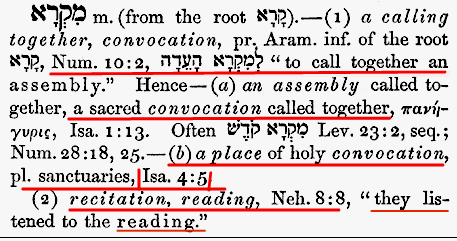
Neh. 8:1 And all the
people gathered themselves together as one man
into the street that
was before the water gate;
and they spake
unto Ezra the scribe to bring
the book of
the law of Moses, which the LORD had
commanded to Israel.
Neh. 8:2 And Ezra the priest brought the law before
the congregation both of men and women,
and all that could
hear with understanding,
upon the first
day of the seventh month.
Neh. 8:3 And he read
therein before the street that was before the water gate
from the morning until
midday, before the men and the women,
and those that could
understand; and the ears of all the people were attentive
Neh. 8:4 And Ezra
the scribe stood upon a pulpit of wood, which they
had made for the purpose;
and beside him stood
Mattithiah, and Shema, and Anaiah, and Urijah, and Hilkiah,
and Maaseiah,
on his right hand; and
on his left hand, Pedaiah, and Mishael, and Malchiah, and
Hashum,
and Hashbadana,
Zechariah, and Meshullam.
Neh. 8:5 And Ezra
opened the book in the sight of all the people; (for he was
above all the people;)
and when he opened it, all the people
stood up:
Neh. 8:6 And Ezra
blessed the LORD, the great God. And all the people
answered, Amen, Amen,
with lifting up their hands:
and they bowed their heads,
and worshipped the LORD with
their faces to the ground
unto the book of the law.
Paul's only
worship words speak of giving heed to the Word of God
and the only prescription for any evangelist was
1Tim.
4:12 Let no man despise thy youth;
but be thou an example of the
believers,
in word, in
conversation, in charity, in spirit,
in faith, in purity
1Tim. 4:13 Till I come, give attendance to
[public] reading, to exhortation, to
doctrine.
Why do you READ the word in order to preach it?
Acts 15:21
For Moses of old time hath in every city
them that preach him,
being read
in the synagogues every sabbath day.
The laded burden
specificially pointed to styles of singing which "created
spiritual anxiety through religious rituals." The REST or
PAUO is the same as SABBATH which was a Word Centered
assembly EXCLUSIVE of "vocal and instrumental rejoicing."
MAYBE A SNAKE IN THE GRASS
Serpent Worship
Many including Joseph Campbell note that when people lose
connection with their old faith they "crack away to the
archaic." In many ways the new style of Shepherding and
musical idolatry has its patternism in the most ancient and
superstitious role of the "prophesier" who controlled the
"gods" with music and magic. H. Bamford Parke in Of
Gods and Men says that this was the oldest
profession chosen because they were emotionally and sexually
abnormal. Neither the Bible nor recorded history offers any
contrary evidence including that of moden musical
professionals: Jesus called them hypocrites by pointing to
Isaiah and Ezekiel.
The Ourobos or Cockatrice: the Head Bites the Tail:
BEGINNING the Biblical Cycle.
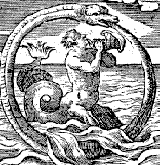 Now,
back to the beginning of the cycle. Of the serpent or
Active Musical Enchanter who connects with the Mother of
Harlots as the tail or passive tail who uses "lusted after
fruits" as rhetoricians, singers and instrument players John
called sorcerers WHO HAD deceived the whole
world. Theosophy is built on this principle.
Now,
back to the beginning of the cycle. Of the serpent or
Active Musical Enchanter who connects with the Mother of
Harlots as the tail or passive tail who uses "lusted after
fruits" as rhetoricians, singers and instrument players John
called sorcerers WHO HAD deceived the whole
world. Theosophy is built on this principle.
"The early Mexican word
nagual, now meaning sorcerer and medicine man, is akin in
its meaning, for "Some of the descendants of the primitive Nagas, the Serpents of Wisdom,
peopled America, when its continent arose during
the palmy days of the great Atlantis, (America being the
Patala or Antipodes of Jambu-Dwipa, not of
Bharata-Varsha)" (SD 2:182). The Hebrew equivalent is nahash also meaning magic, enchantment, thus showing the same
connection of ideas.
"Naga may be equated with
Ananta-sesha, the seven-headed endless serpent of Vishnu, "the great dragon
eternity biting with its active head its passive tail,
from the emanations of which spring worlds, beings and
things. . . . The Nag awakes. He heaves a heavy breath and
the latter is sent like an electric shock all along the
wire encircling Space" (ML 73).
"Naga-dvipa (Sanskrit) The island
of the dragons; one of the seven divisions
of Bharata-varsha or India, according to the Puranas. The
nagas were an historical
people,
but now unknown. "When the Brahmans invaded India they
'found a race of wise men, half-gods, half-demons,' says
the legend, men who were the teachers of other races and became likewise the
instructors of the Hindus and the Brahmans themselves. Nagpur is justly believed to be the
surviving relic of Nagadwipa. Now Nagpur is virtually in
Rajputana, near Oodeypore, Ajmere, etc. And is it not well
known that there was a time when Brahmans went to learn Secret
Wisdom from the Rajputs? Moreover a tradition states
that Apollonius of Tyana was instructed in magic
by the Nagas of Kashmere" (TG 222-3)."
Paul
said that Eve was "wholly seduced" as a young wife is
taken prematurely. Therefore, Cain was "of that
wicked one. Cain through the EVIL LAMECH THREAD
produced Jubal. Eve reveals the TOUCH concept and Jubal
reveals the HANDLE concept: always there is a sexual or
perverted sexual meaning.
Again see the primary meaning of psallo. ALL musical
terms and names of instruments are rooted in doing vile
things.
You will notice that the first meaning is to TOUCH or
HANDLE connects to Eve where the Serpent was a musical
enchanter and was "Lucifer the singing and harp playing
prostitute." Psallo has be BASE meaning of to TOUCH or HANDLE.
The TOUCH and MUSIC connection begins with Eve
EVE ADDED THE TOUCH WORD TO GOD'S COMMAND: SHE DIDN'T
INTEND TO TOUCH AN APPLE.
First, all about Eve: The meaning of
TOUCH Jesus said was hidden from the false clergy in
parables.

 Now,
back to the beginning of the cycle. Of the serpent or
Active Musical Enchanter who connects with the Mother of
Harlots as the tail or passive tail who uses "lusted after
fruits" as rhetoricians, singers and instrument players John
called sorcerers WHO HAD deceived the whole
world. Theosophy is built on this principle.
Now,
back to the beginning of the cycle. Of the serpent or
Active Musical Enchanter who connects with the Mother of
Harlots as the tail or passive tail who uses "lusted after
fruits" as rhetoricians, singers and instrument players John
called sorcerers WHO HAD deceived the whole
world. Theosophy is built on this principle.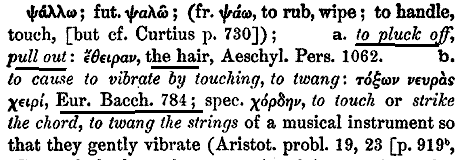
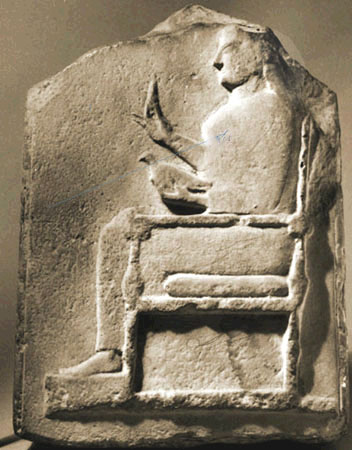 Gen.
10:8
And Cush begat Nimrod: he began to be a mighty one in the
earth.
Gen.
10:8
And Cush begat Nimrod: he began to be a mighty one in the
earth.  "The traditional
Jewish interpretation of this verse implies that it
marked the beginning of idolatry, i.e. that
men starting dubbing "Lord" things that were mere creatures.
This is because the previous generations, notably
Adam, had already "begun calling upon the name of
the Lord", which forces us to interpret הוחל huchal
not as "began" but as the homonym "profanated".
In
this light, Enosh suggests the notion of a humanity
(Enoshut) thinking of itself as an absolute rather
than in relation to God (Enosh vs. Adam).
"The traditional
Jewish interpretation of this verse implies that it
marked the beginning of idolatry, i.e. that
men starting dubbing "Lord" things that were mere creatures.
This is because the previous generations, notably
Adam, had already "begun calling upon the name of
the Lord", which forces us to interpret הוחל huchal
not as "began" but as the homonym "profanated".
In
this light, Enosh suggests the notion of a humanity
(Enoshut) thinking of itself as an absolute rather
than in relation to God (Enosh vs. Adam). 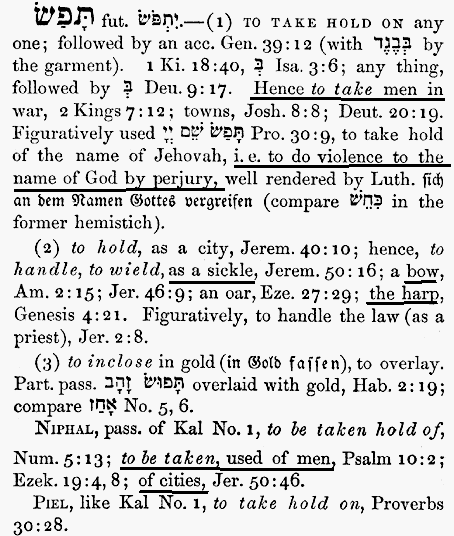
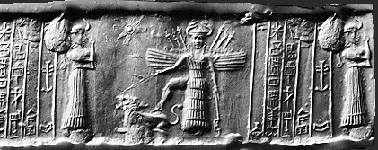
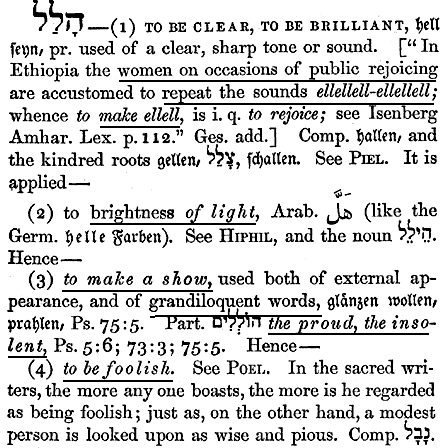
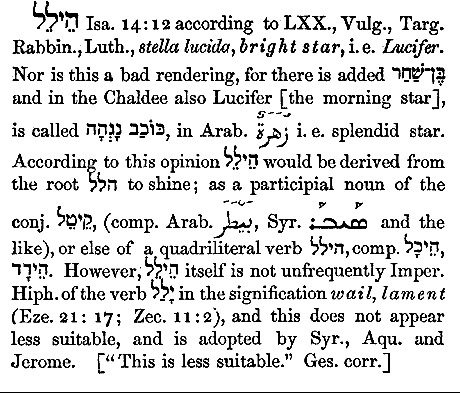
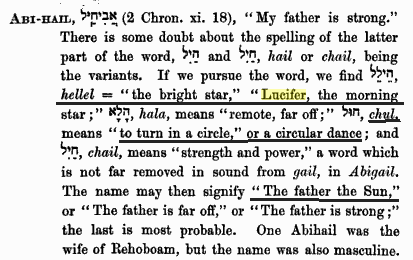
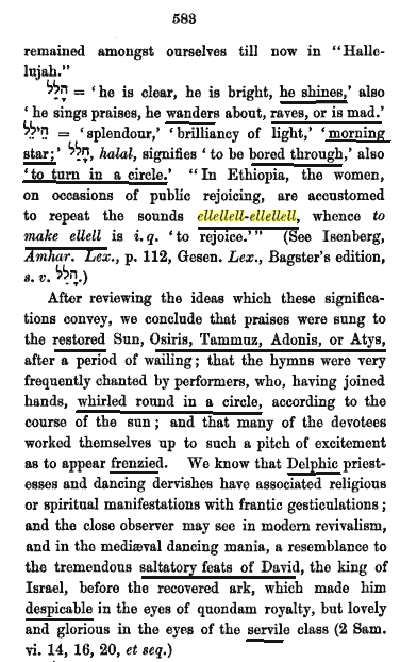 There is what the
Hireling-Changelings intend to drage you into like a wolf
gnawing the bones of the fleeced lamb.
There is what the
Hireling-Changelings intend to drage you into like a wolf
gnawing the bones of the fleeced lamb. l
l t
t -tôr
-tôr
 , sôl
, sôl